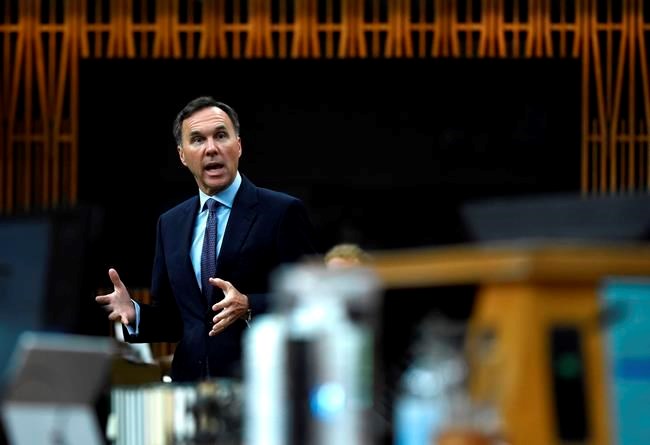OTTAWA — Finance Minister Bill Morneau is defending the state of the country's finances after an international agency stripped Canada of its triple-A credit rating.
He says Canada continues to be a in a stronger financial position than many other G7 and G20 countries, noting continued global investment in Canadian bonds is contributing to drive down the cost of borrowing.
In a statement, Morneau said the federal government "will continue to be fiscally responsible" while doing what's necessary to protect the domestic economy.
The statement came after Fitch Ratings dropped the country to a "AA+" rating on Wednesday over what it called "the deterioration of Canada's public finances" due to the COVID-19 pandemic.
Public health measures needed to slow the spread of novel coronavirus and depressed oil prices "will cause a severe recession" in Canada this year, Fitch said in an online notice, forecasting a contraction of 7.1 per cent.
Canada had seen about 1.7 per cent annual growth leading up to the pandemic, but Fitch says the country's medium-term growth prospects are limited and below many of its peers.
Separately Wednesday, a new estimate from the International Monetary Fund forecast a contraction of 8.4 per cent for Canada's economy — 2.2 percentage points below its April estimate.
The Liberals' latest estimated cost of the total package of pandemic-related aid was about $153.7 billion, but the parliamentary budget officer's running tally estimates the cost at $169.2 billion.
"Going into the global pandemic, Canada was in a great position to deploy our fiscal firepower to protect Canadians and we have. A worse case scenario for Canadians and the economy would have been to not act," Morneau's statement says.
"Canada's COVID-19 response is ensuring workers and businesses have the financial support they need to weather this crisis and come back strong."
Fitch says federal spending may have to go up even higher to help cash-strapped provinces, including those that have paused deficit-reduction plans.
It also adds that the minority Liberal government had already put off a promise to stabilize net federal government debt "to address the priorities of allied minority parties."
Looking forward, Fitch says the country's rating could go up if governments get back to having the debt decline as a percentage of the economy, or see the rating drop again if policy-makers fail to do so over the medium-term.
"This may not be the last downgrade," Conservative finance critic Pierre Poilievre wrote on Twitter.
The Canadian Taxpayers Federation says the downgrade could mean higher interest costs that will starve governments of already scarce revenues.
"The federal government cannot simply shrug off this downgrade," federal director Aaron Wudrick said in a statement. "Getting Canada's finances back on track won't be easy, but it'll only get harder the longer we wait."
In two weeks, Morneau will deliver what he is calling a fiscal snapshot that will detail spending to date and expectations for the rest of the fiscal year, including the size of the deficit and national debt.
The PBO has estimated the deficit could be $256 billion this fiscal year, which would push the federal debt to $962 billion.
"Not what the Government is hoping for, as it prepares to deliver its fiscal 'snapshot' on July 8," tweeted parliamentary budget officer Yves Giroux.
This report by The Canadian Press was first published June 24, 2020.
The Canadian Press




